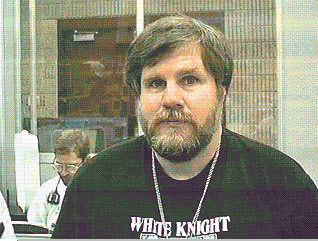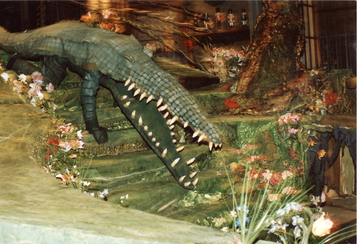About Cavebear
Here is a rare photograph of the CaveBear in the wild:

Scary! But don’t worry, he rarely bites.
You want to know more? OK. Below are a few links to more detailed items:
Who Is Karl
If you are looking for a short bio then click here.
 So, I bet the first thing you want to know is what I look like. The photo on the left is nearly a decade old, but I like it. The vicissitudes of Internet politics, life at startups, and life in general have left me with a bit more gray around the edges.
So, I bet the first thing you want to know is what I look like. The photo on the left is nearly a decade old, but I like it. The vicissitudes of Internet politics, life at startups, and life in general have left me with a bit more gray around the edges.
Some people have said "Karl is a crock".
And I’m here to say that they are right… sort of…
Yes! That that is me over there to the lower right.
I was understudy crocodile in a production of Peter Pan.
It is true that I hold some strong opinions. This website is full of materials that articulate and elaborate on those opinions so I won’t go into a lot of detail here except to say that I firmly believe that modern governance - political and of the internet - is in serious trouble unless we abandon the corrosive concept of stakeholderism and return to the principles of constrained government and separation of powers, as articulated by so many of the great thinkers of the 18th century.
What Is A CaveBear
Who or what is CaveBear? The "where" part is easy: 37° 00' 02 North by 122° 00' 59 West - which just so happens to be in the City of Santa Cruz in the State of California.
CaveBear was formed by me, (Karl Auerbach) in Mid 1994.
CaveBear is an organization for research, consulting, product development, and other matters related to the internet. CaveBear explores new ways of making the Internet a more useful place for people. Projects include:
- Tools for network diagnosis and repair.
- The homeostatic (self-healing) internet.
- Lifeline grade internet services.
- Capability computer architectures and operating systems.
- Internet governance.
- Internet law and policy.
- Protocol interoperability analysis and testing.
- Internet humor.
- The History of the Internet Project (sponsored by InterWorking Labs).
Shakespeare said - "what’s past is prologue, what to come in yours and my discharge." If CaveBear is about anything, it is about new ideas and new things.
Karl CV/Bio
(This is a reduced version of the the full, long CV - https://www.cavebear.com/about/karl-cv-long/)
Mr. Auerbach is the Chief Technology Officer at InterWorking Labs (IWL) in Scotts Valley, California.
Mr. Auerbach was the first (and only) North American publicly elected member of the Board of Directors of ICANN, the Internet Corporation for Assigned Names and Numbers.
Karl Auerbach was formerly a senior researcher in the Advanced Internet Architecture group in the Office of the Chief Strategy Officer at Cisco Systems.
In addition to his technical work, Mr. Auerbach has been an attorney in California since 1978. He is a member of the Intellectual Property Section of the California State Bar.
In 2002 he received the Norbert Wiener Award from the Computer Professionals for Social Responsibility (CPSR).
Karl CV/Bio - Long Form
(For the most recent version of this page, go to https://www.cavebear.com/about/karl-cv-long/)
Karl Auerbach has been creating and extending Internet and operating system technology since the early 1970s. He has worked at all levels, from hardware to protocols to applications to legal policy.
In addition to his technical work, Mr. Auerbach has been an attorney in California since 1978. He is a member of the Intellectual Property Section of the California State Bar.
Mr. Auerbach is the Chief Technology Officer at InterWorking Labs (IWL) in Scotts Valley, California.
Karl’s home page is at http://cavebear.com/.
Karl is a “Pioneer Member” of the Internet Society.
Recently, Karl has become concerned that our efforts to improve Internet and device security have overlooked our need to manage and repair the Internet. Security barriers have made it increasingly difficult to locate, isolate, and repair faults.
Scope
For more than five decades Karl has been involved in nearly every aspect of Internet technology and in much of the related national and international policy. There are few with Karl’s synoptic view of the Internet. Karl has worked with Internet technology from the electronic signaling layer all the way up through applications.
Karl was influenced by Dave Farber’s DCS network to think of networks as distributed systems with dynamic behavior and properties similar to that of a large scale industrial process.
Karl’s perspective on Internet policy is condensed into his “First Law of the Internet”:
- Every person shall be free to use the Internet in any way that is privately beneficial without being publicly detrimental.
- The burden of demonstrating public detriment shall be on those who wish to prevent the private use.
- Such a demonstration shall require clear and convincing evidence of public detriment.
- The public detriment must be of such degree and extent as to justify the suppression of the private activity.
- The burden of demonstrating public detriment shall be on those who wish to prevent the private use.
Karl was among the first to bring together law and network technology, particularly with regard to privacy and domain name policy.
Karl has long strongly advocated that the Internet must be considered a lifeline grade utility. He has argued this point several times, such as in his 2003 presentation “From Barnstorming to Boeing – Transforming the Internet Into a Lifeline Utility”, his 2019 Keynote presentation at NANOG, and his long time position that the Internet should be managed less as individual, independently acting devices and more as a complex distributed process.
Karl’s technical work has contributed to the expansion, security, and reliability of the Internet.
His work on Internet policy and privacy have contributed to the development of Internet Governance and protections for users.
Karls work on tools and testing have led to an internet that is more robust and interoperable. And through Karl’s tools and testing people everywhere have increased assurance that their Internet devices will actually work.
His work with network security, although largely confined to the military sphere, advanced the art of both network and operating system security.
Karl’s work with John Romkey’s PC/IP, Packet Drivers, the ULANA effort, and Interop helped publicize and deploy interoperable TCP/IP code in an era when networking was largely for larger computers.
Karl’s leadership in articulating the technical goals and reasoning for design decisions in IETF meetings and on IETF mailing lists for 50 years has had major influence on two generations of technologists.
Karl, an attorney and member of the California Bar, has formed or led policy discussion groups and bridged the gap between Internet technology and government representatives, policy makers, lawyers, and academic researchers.
His work with voting contributed significant advances to trustworthy open source, inspectable testable voting machines and software.
Significant Achievements
During the 1970s Karl designed and implemented some of the first operating systems and networks based on formal security models. In this work Karl created the first encrypted VLANs, Virtual Private Networks, cryptographic key management protocols, message digests, access controllers, and multi-level secure networks.
During the 1980s and later Karl worked with several others to bring small computers into the nascent Internet.
His testing tools and his lead roles at “bakeoff” events, the ULANA project, and the Interop show net greatly increased the probability that network devices from different vendors would actually work with one another.
Karl created the first Internet “butt set”, a highly portable device that could be brought into the field by network repair teams to rapidly analyze problems.
In the mid 1990s Karl architected and implemented IP/TV, a pioneering product for internet distribution of entertainment grade video over the internet.
Karl’s efforts building tools, developing interoperability tests, and designing, deploying, and running the Interop show networks have facilitated Internet growth and the quality of Internet devices.
Karl has been a long-time member of the Internet Engineering Task Force (IETF). During that time Karl participated in, or chaired, working groups that led to the creation of widely used, full Internet Standards.
Mr. Auerbach served as a publicly elected member of the Board of Directors of ICANN, the Internet Corporation for Assigned Names and Numbers.
Karl is a co-founder of the Boston Working Group and has been involved in the issue of Internet governance for several years.
Karl has long been interested in questions related to Internet reliability, particularly as the Internet evolves into a critical element of our infrastructure.
Karl has a strong interest in network diagnostic tools
Karl was a principal in the creation of open voting systems. He was formerly on the Board of Directors of the Open Voting Consortium.